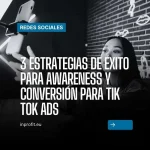Marketing, as a key tool for connecting with audiences, must also adapt to this change, prioritizing strategies that resonate with the values of conscious consumers.
Throughout this article, we will explore how companies can integrate sustainability into their marketing strategies, generate positive impact and build lasting relationships with their audiences.
Sustainable Marketing What is it?
Sustainability is not just a trend; it is a commitment that brands must embrace to connect with an audience that is increasingly aware of their environmental impact. Today’s consumers value transparency and purpose behind the brands they choose. Incorporating marketing strategies that promote responsible practices, such as the use of recyclable materials, ethical production processes and honest messaging, not only improves brand perception, but also fosters a long-term relationship of trust.
In addition, sustainable marketing allows brands to differentiate themselves in a saturated marketplace. Creating campaigns that highlight green initiatives, such as reducing carbon footprint or supporting local communities, can resonate deeply with consumers. This approach not only drives sales, but also turns customers into brand ambassadors, willing to share their positive experience in their social and digital circles.
The challenge is to align sustainability values with marketing strategies without falling into greenwashing. Conscious consumers expect genuine actions backed by tangible results. From implementing recycling programs to developing products with reduced environmental impact, every step toward sustainability is an opportunity to strengthen the emotional connection with a loyal and responsible consumer base.
A change in consumer behavior
Today’s consumers are looking for more than just products; they are looking for purpose. A recent study revealed that more than 70% of consumers prefer to buy from brands that share their values, especially when it comes to sustainability. From opting for recyclable packaging to supporting environmental initiatives, customers expect companies to not only be responsible, but also to lead change toward a more sustainable future.
Social networks and access to information have made consumers more critical of corporate practices. It is no longer enough to claim that a company is sustainable; brands must prove it with concrete and transparent actions. Companies such as Patagonia and The Body Shop are examples of how sustainability can be integrated into a brand’s DNA, earning not only customer loyalty, but also their respect.
Sustainable Marketing: More than a trend, a necessity
Sustainable marketing is not just about promoting green products, but about communicating a broader purpose. An effective campaign must inspire, educate and emotionally connect with consumers, showing them how their choices can contribute to a better world.
For example, Ikea has developed campaigns that not only promote its sustainable furniture, but also educate customers on how to reduce waste in the home. Similarly, fashion brands such as Stella McCartney are leading the industry with initiatives that highlight their efforts in recycled materials and ethical production.
The sustainable approach also involves making conscious decisions in every aspect of marketing, from the choice of packaging materials to the use of digital rather than print platforms to reduce environmental impact.
How to create a Sustainable Marketing strategy?
Transparency as a basis
Sustainability should not be a window dressing strategy. Companies must be clear and honest about their efforts, even if they are still in the process of improvement. This includes being transparent about materials used, supply chains and long-term goals.
One notable example is Unilever, which publishes annual reports on its progress toward sustainable goals, such as reducing its carbon footprint and improving labor conditions in its supply chain.
Engaging the consumer
Campaigns that invite consumers to participate have a stronger impact. This can be through recycling programs, incentives to choose sustainable products or social challenges that promote responsible behavior.
For example, Coca-Cola launched a campaign where consumers could return empty bottles to specific collection points, encouraging them to actively participate in the circular economy.
Telling meaningful stories
Storytelling is a powerful tool. Brands can share authentic stories about their commitment to the environment, highlighting how their products or services make a positive impact.
Brands such as Timberland have used storytelling to show how their production processes help restore forests and local communities, connecting emotionally with their audiences.
The main benefits
Sustainable marketing benefits not only the environment, but also brands:
- Customer Loyalty: Conscious consumers tend to be more loyal to brands that share their values.
- Market Differentiation: In a competitive environment, sustainability becomes a key differentiating factor.
- Increased Investment Attraction: Investors are prioritizing companies with sustainable practices, considering them more future-proof.
While the benefits are clear, sustainable marketing also presents challenges. One of the main ones is avoiding “greenwashing,” or the misleading use of sustainable terms without real backing. This can damage a brand’s reputation and generate distrust.
Another challenge is cost. Implementing sustainable practices, such as switching to environmentally friendly materials or investing in clean technologies, can require a significant upfront investment. However, the long-term benefits often outweigh these costs.
The future of Sustainable Marketing
Sustainable marketing will continue to evolve, driven by technological advances and increased access to data. Analytics tools will enable companies to accurately measure their environmental and social impact, integrating these results into their campaigns.
In addition, e-commerce will play a key role in sustainability. Companies can optimize their supply chains, reduce the use of physical materials and offer green delivery options, such as electric transport or bundled shipments.
Ultimately, brands that embrace sustainability as a core pillar will be better positioned to thrive in a world where consumers value both purpose and quality.
Sustainability is no longer an option, it is an expectation. Conscious consumers are looking for brands that not only understand their values, but also act on them. Sustainable marketing, when done with authenticity and commitment, not only generates business results, but also contributes to a better world.
Companies that lead this change will not only win customers, but will also become the benchmark of a new era of responsible consumption. Is your brand ready for the challenge?

Marketing tecnológico en vena. Fanático de las tecnologías Martech que rompen moldes: IA generativa, blockchain, no-code, metaverso, automatización extrema… Convencido de que el futuro no se espera, se construye (y se vende muy bien).
Responsable del marketing más disruptivo y tecnológico.




